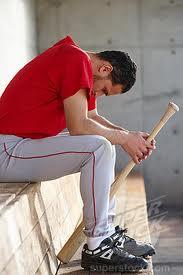
How important is the game to you?
As I mentioned in a post a few days ago, this week is tryout week for most high schools in Pennsylvania. For players and parents, the week is filled with gossip and debate as to who is showing well and who might make the JV and varsity rosters. Of course, it all culminates in the final selections made by the coaching staff. That’s a tough day for many kids, many of whom have never experienced not making a baseball team before. For some players, they saw it coming and probably knew ahead of time that their chances were slim. For others, it came out of left field and blindsided them. These are the kids your heart breaks for. It’s tough enough to have to see your name not on the list but to have to go to school/class and hear those who made the team talk about their excitement makes it even worse. For these kids, their baseball careers are at a crossroad and how they react in the short term will have dire consequences on how their career proceeds from here on. Below is my advice for players who are not sure what to do now.
How important is the game? First and foremost, a player has to answer this very important question. However, before doing that, the player has to separate himself from his anger, frustration, resentment, sadness, etc. It is perfectly ok for a player to feel these emotions but at some point, he needs to set all that aside and honestly answer that question. Moving past these emotions can happen quickly or it could occur slowly over time. Every kid is different but the important thing is that it must eventually occur. Hopefully sooner rather than later. If the player honestly sees baseball as not all that important then he should look for other activities/sports to participate in. I’ve had numerous players not make the team, move on to another sport, and become star players. If the player still sees baseball as very important to him, he can continue reading for the additional pieces of advice.
Find out why. Talk to the coach. Ask him for some feedback about what he saw and how he rated your skills. At the meeting, you want to focus on what your strengths and weaknesses are in his view. Don’t argue and don’t talk about other players. The meeting should be about you and only you. Just ask and listen. These meetings can be very intimidating for young people but they are immensely valuable. Because of the intimidation factor, I would suggest that a player go into this meeting with a few questions written down. Often the player will forget the questions if they are not written down. And another thing. This meeting is not for parents. Players should always talk to the coach first. Let the player experience this life lesson on their own. Parents should certainly help with the creation of questions but let the player handle the meeting. I would not recommend the parent meet the coach but if a parent feels the need to, don’t compare your player to others who made the team, don’t question the coach’s judgment, and by all means, don’t bring up your son’s past success in baseball. Focus only on strengths and weaknesses and what he should do (drills, technique, etc.) to improve. Stick to the facts and separate yourself from the emotion.
Avoid the blame game. Blaming others or any other external factor for you not making the team may be easier on your ego but it will always make you look immature in the eyes of others. If you need to vent in this way, keep it within the privacy of your own home. This goes for parents as well. The best answer to give others in public is “I am disappointed but it just didn’t work out.” Say no more. If people start to direct the conversation towards any kind of unfairness, politely listen but don’t add anything. Take the high road. Every ounce of your body might want to scream about the injustice of it all but don’t do it.

Gas or water? You decide.
Learn a new position. The more skills you have the more valuable you become to others. It’s true in business and it’s true in baseball. The two positions that teams need the most tend to be pitchers and catchers. If you don’t play those positions, learn to. Your future value will jump if you do. Teams never have enough pitching and very few kids are willing to squat behind the plate.
Gas or water? Learning new positions and improving on your overall physical game is certainly important but ultimately it will come down to how you handle all this from the mental side. Basically, is this piece of adversity going to throw gas or water on your desire to keep playing? If you decide on gas, this adversity could be the best thing that ever happened to you. The gas will ignite that inner flame like never before and motivate you to get you off your butt in order to prove to everyone that you are the player you think you are. If you decide on water, your baseball flame will be put out. Either one is fine. You just have to decide which one it’s going to be.

